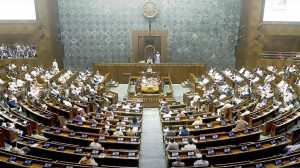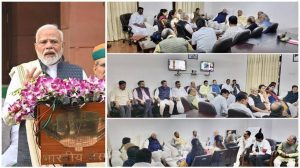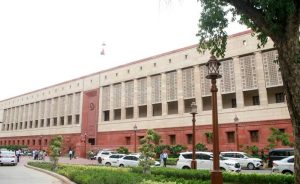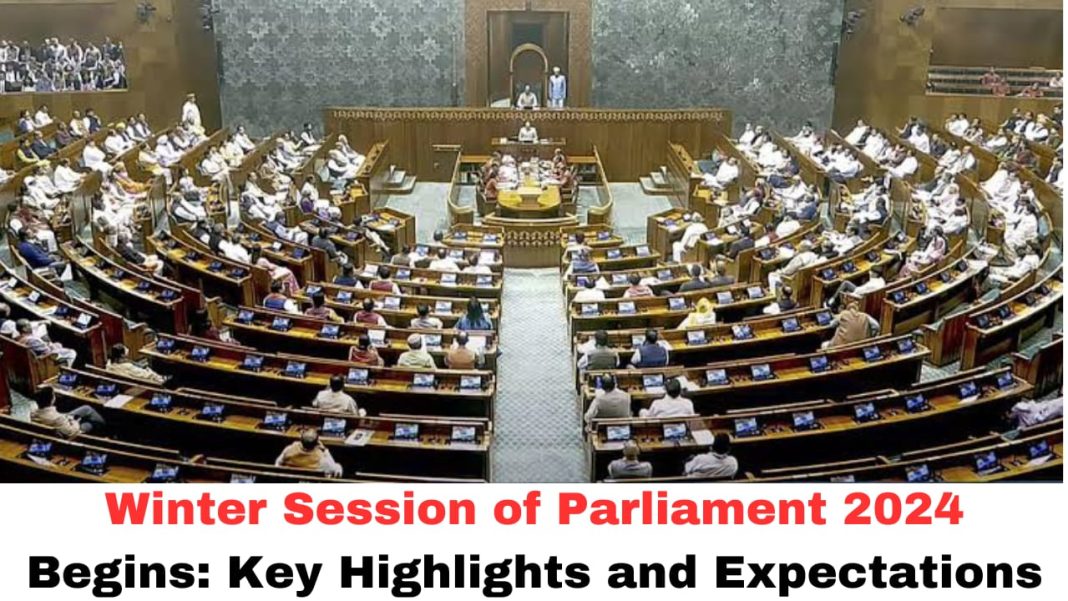Digital News Guru Delhi Desk:
The Winter Session of the Indian Parliament began today, November 25, 2024, marking the start of a critical legislative calendar. Scheduled to continue until December 20, the session will encompass 19 sittings and focus on debates around key legislation, political accountability, and the government’s policy priorities. This session is of particular significance as it unfolds in the run-up to the 2024 general elections, setting the tone for the nation’s political discourse.
Key Legislative Priorities
The session’s agenda includes the introduction and deliberation of 16 bills, covering a wide array of issues from infrastructure development to governance reform. Among the highlights are:

- Waqf (Amendment) Bill, 2024
This bill proposes changes to the Waqf Act, 1995, enabling non-Muslim representation in the Central Waqf Council and local boards. Additionally, it grants more authority to district collectors for conducting property surveys, aiming to streamline the management of waqf properties and resolve disputes. - Coastal Shipping Bill, 2024
Aimed at enhancing maritime trade, this legislation focuses on encouraging coastal shipping under Indian vessels to improve trade efficiency while supporting national security. - Merchant Shipping Bill, 2024
This bill seeks to modernize the regulatory framework for shipping and ensure compliance with international maritime treaties, signaling India’s commitment to global standards. - Disaster Management (Amendment) Bill, 2024
This proposed legislation introduces provisions for creating urban disaster management authorities and state-level disaster response forces. These changes aim to address the growing challenges posed by urbanization and climate change. - Rashtriya Sahkari Vishwavidyalaya Bill, 2024
This bill will pave the way for the establishment of a national cooperative university, promoting higher education and skill development within India’s cooperative sector.
Political Stakes and Debates
As the last full legislative session before the upcoming general elections, the Winter Session is expected to be politically charged. The Opposition’s agenda will likely focus on holding the government accountable on key issues such as:

- Manipur Conflict: The ethnic violence in Manipur remains a flashpoint, with demands for a comprehensive debate on the government’s handling of the crisis.
- Corporate Transparency: Allegations surrounding large corporate houses and questions of crony capitalism are expected to dominate discussions.
- Women’s Reservation Act: Though passed earlier this year, the implementation of the Act and its timeline will be scrutinized, with demands for clarity on steps to ensure its enforcement.
The government, on the other hand, is likely to emphasize its achievements in infrastructure development, legislative reform, and social welfare policies. These discussions will serve as a prelude to campaign narratives for 2024.
Expectations from the Session
Observers are keenly watching this session for indications of how contentious issues will impact parliamentary productivity. Recent sessions have seen disruptions due to political disagreements, and the ruling coalition will need to navigate opposition-led protests to ensure progress on legislative priorities.
The session also coincides with Constitution Day on November 26, commemorating 75 years of India’s Constitution. This milestone is expected to inspire reflections on democratic progress while reaffirming the Parliament’s role in shaping the nation’s future.
Broader Implications
The legislative measures proposed during this session aim to address critical gaps in governance, economic development, and public administration. For example:
- The Merchant Shipping Bill and the Coastal Shipping Bill are designed to position India as a leader in maritime trade and logistics.

- Reforms to the Disaster Management Act aim to make urban areas more resilient to disasters, a pressing need given the increasing frequency of extreme weather events.
If passed, these bills will have lasting impacts across various sectors, from boosting trade to enhancing the efficiency of disaster response mechanisms.
Conclusion
The Winter Session of Parliament 2024 serves as a pivotal moment for India’s democracy. With an ambitious legislative agenda and high-stakes political debates, it is both an opportunity for governance reform and a test of parliamentary collaboration. As the session unfolds, the nation will watch closely, evaluating not just the laws passed but also the dialogue that shapes them, as India marches toward its next electoral milestone.
You May Also Read: Agra Fort: The Fortress That Witnessed the Rise and Fall of Empires








